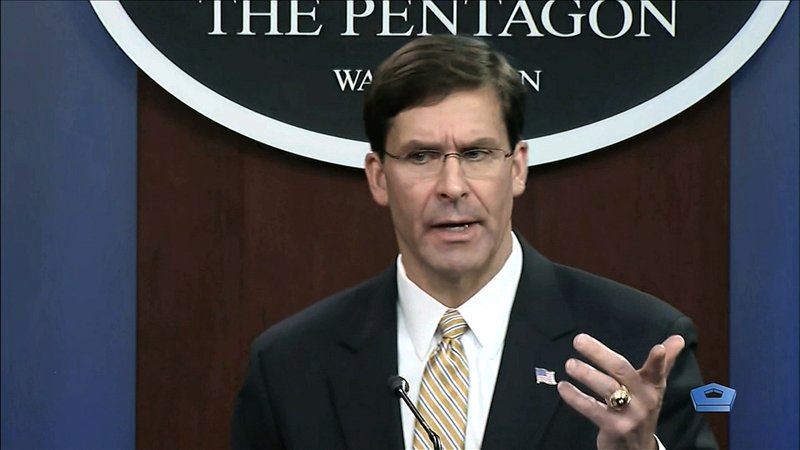Defense Secretary Mark Esper and other administration officials joined President Donald Trump in trying to draw attention to dissent in Iran instead of lingering questions about the scale of the threat used to justify a drone strike on Iran’s top military leader.
Esper added to the uncertainty over the intelligence behind this month’s killing of Gen. Qassem Soleimani when he said Sunday that he had seen no hard evidence that four American embassies had been under possible threat. Trump said last Friday that Soleimani had been planning such an attack.
In appearances on Sunday news shows, both Esper and national security adviser Robert O’Brien said they agreed that Iran might have hit more than just the U.S. Embassy in the Iraqi capital. “It is certainly consistent with the intelligence to assume that they would have hit embassies in at least four countries,” O’Brien said.
But Esper, when asked whether there was a specific piece of evidence, replied: “I didn’t see one with regard to four embassies.″ And in response to a question about whether Trump was “embellishing″ the threat, Esper said, ”I don’t believe so.”
In a tweet both defiant and dismissive, Trump turned his attention again to supporting Iranian protesters and warning the Iranian government not to attack them or to pursue nuclear weapons. He tweeted: “National Security Adviser suggested today that sanctions & protests have Iran ‘choked off’, will force them to negotiate. Actually, I couldn’t care less if they negotiate. Will be totally up to them but, no nuclear weapons and ‘don’t kill your protesters.’
O’Brien had suggested the United States sees this moment as an opportunity to further intensify pressure on Iran’s leaders, with whom the U.S. has been at odds for four decades. Iran’s leaders already are under enormous strain from economic sanctions that have virtually strangled Iran’s main source of income — oil exports. Esper said street protests in Tehran show the Iranian people are hungry for a more accountable government after leaders denied, then admitted shooting down a Ukrainian passenger plane.
“You can see the Iranian people are standing up and asserting their rights, their aspirations for a better government — a different regime,” Esper said.
Trump’s order to strike at Soleimani came as he was already under pressure ahead of an impeachment trial in the Senate. Many in Congress complained that the administration did not consult them in advance and did not adequately brief members afterward.
After the U.S. killed Soleimani in Baghdad, it appeared the backlash in Iran and elsewhere had helped Tehran by shifting the focus away from its internal problems. The strike also seemed to divert attention away from domestic unrest in Iraq over government corruption, and it intensified efforts by Iraqi politicians to expel American and other foreign forces.
But the shootdown of the Ukrainian plane on the night of the Soleimani strike, killing all 176 people aboard, opened a new avenue of pressure for the Trump administration.
“I think the regime is having a very bad week,” O’Brien said.
“This was a regime that’s reeling from maximum pressure, they’re reeling from their incompetence in this situation and the people of Iran are just fed up with it,” he said, adding that regime change is not U.S. policy.
“The people of Iran are going to hopefully have the ability at some point to elect their own government and to be governed by the leaders they choose,” O’Brien said.
In Tehran, Iran’s security forces deployed in large numbers on Sunday. Demonstrators defied the heavy police presence to protest their country’s days of denials that it shot down the Ukrainian plane. Videos posted online showed protesters shouting anti-government slogans and moving through subway stations and sidewalks.
Iranians have expressed anger over the downing of the Ukrainian flight and the misleading explanations from senior officials in the immediate aftermath. Later the government took the blame for the shootdown, saying it was caused by human error.
Reviewing the dramatic sequence of events that preceded the downing of the Ukrainian jetliner Wednesday, Esper justified the U.S. killing of Soleimani as an act of self defense, and he said the U.S. foresees no more Iranian military attacks in retaliation for that. Even so, the leader of the Lebanese militant group Hezbollah, which is closely aligned with Iran, said Sunday that Iran’s missile attacks on two bases in Iraq housing U.S. forces last week were only the start of the retaliation.
Hassan Nasrallah described Iran’s military response, which caused no casualties, as a “slap” at the U.S. He called it the “first step down a long path” that will ensure U.S. troops withdraw from the region.
Democratic Sen. Chris Coons of Delaware, a member of the Senate Foreign Relations Committee, said he was concerned that “Iran has lots of ways that they can take action against us, both overt and covert, and I don’t think they’re done trying to seek revenge.″
Esper spoke hopefully of getting the NATO alliance more involved in Iraq to help train Iraqi security forces. He said this could allow him to reduce the number of American troops in Iraq, currently numbering more than 5,200, but he did not say any reduction was in the works yet.
Esper appeared on CBS’ “Face the Nation″ and CNN’s “State of the Union.″ O’Brien appeared on ABC’s ”This Week,″ “Fox News Sunday” and NBC’s “Meet the Press.” Coon was on Fox.
(AP)











